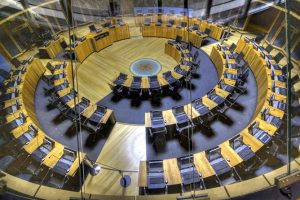 LEANNE WOOD was not at all satisfied with a fourth place finish in the 2015 General Election.
LEANNE WOOD was not at all satisfied with a fourth place finish in the 2015 General Election.
Her immediate response to the loss – and the mere hold of her three MPs – was to declare that the campaign for the National Assembly elections of May 2016 would commence without pause.
This most recent campaign has been the culmination of decades of political action: miner’s strike, devolution, various assembly elections, and the 2011 referendum.
Already in campaign mode, and convinced that there would have been a breakthrough in the General Elections with a few more weeks to campaign, Wood began a series of major engagements: visiting local constituencies, attending cultural events, making visits to schools and giving major addresses on politics and policy at Aberystwyth University. Linking up her network on the ground, Wood engaged local organisations in the campaign, giving speeches at party events and demonstrations, outlining her message for the May elections.
With the “What Next for Wales?” campaign in full gear, she decisively answered a quip by one of her aides Simon Thomas, who suggested that she was better suited to campaigning than to intellectual “stuff” (Wales Online, 12 May 2015). Wood countered by not only giving many speeches on policy and political affairs, but also by using the campaign itself to disseminate her ideas and build her network across Wales.
The long campaign has been energised by immense personal loyalty that Plaid members’ have for Wood’s leadership. No one questioned her strategy of an immediate campaign, but picked up their shovels and joined her work for a change of government in Wales.
Leanne Wood is certainly seeking national liberation for Wales. Yet, independence is her longest campaign. She is often asked by commentators how she squares her quest for a socialist republic with the pragmatic necessity of getting on with the “system as it is”.
She will answer that the “system as it is” is the result of historical action and events, and that the people of contemporary Wales have the same capacity for action and change. In a post-devolution framework, moreover, the National Assembly is a state in embryo, one which can be brought to fruition with the enhancement of its autonomy and powers, over eg. social security, healthcare, taxation, policing and criminal justice, natural resources, drug policy, land policy, airspace – and other powers appropriate for a European-oriented democratic republic and nation in its own right.
For Wood, Wales is a nation to come, one that will be built by the generations of those who live here, by a multi-lingual and multi-ethnic population, for the sake of a better life and a stronger, more local, democracy – one that serves the wishes and aspirations of Wales.
Leanne Wood was never going to be the usual politician.
Her expulsion from the National Assembly on her first day as AM was hardly auspicious – or was that her point after all? She was contesting, re-valuing, a distinctly British value – honour to the Queen – to the British sovereign – of one unelected versus Wood’s own democratic mandate.
Wood began her political career with a denunciation of British sovereignty over Wales. She campaigns now for the governance of Wales, for First Minister and the acceleration of the national process.
Yet, the building process, though it would be greatly accelerated by a Plaid victory, does not of itself require a nationalist government, but an intensified movement for home rule, enhanced powers, and compliance of the UK government with the 2011 referendum.
Wood has nearly perfected the campaign as a form of organising political change. A campaign is a real time affair that provides the vast array of individual events with a cohesive momentum. If one is committed to forming a new nation, one must cultivate the most broad-based and effective national outreach network, a campaign that is the process of nationbuilding itself.
In this way, even if she comes up short in May to form an outright government, Wood will have an even stronger voice for transformative politics as the leader of the progressive opposition (especially as the Tories will still hold Westminster), one that remains strongly linked to mass organisations on the ground, such as Adam Price’s Yes Cymru, and with the UK-wide progressive opposition in activist networks and in the UK parliament.
Currently contending with Labour for the leadership of the National Assembly, Wood’s long campaign has paid off, and even offers the chance for accelerated national transformation.
As momentum is moreover connected to political direction, the winds are clearly in the Wood’s favour as the necessity for a mature national framework has become increasingly urgent for the protection and development of Wales.

















Add Comment